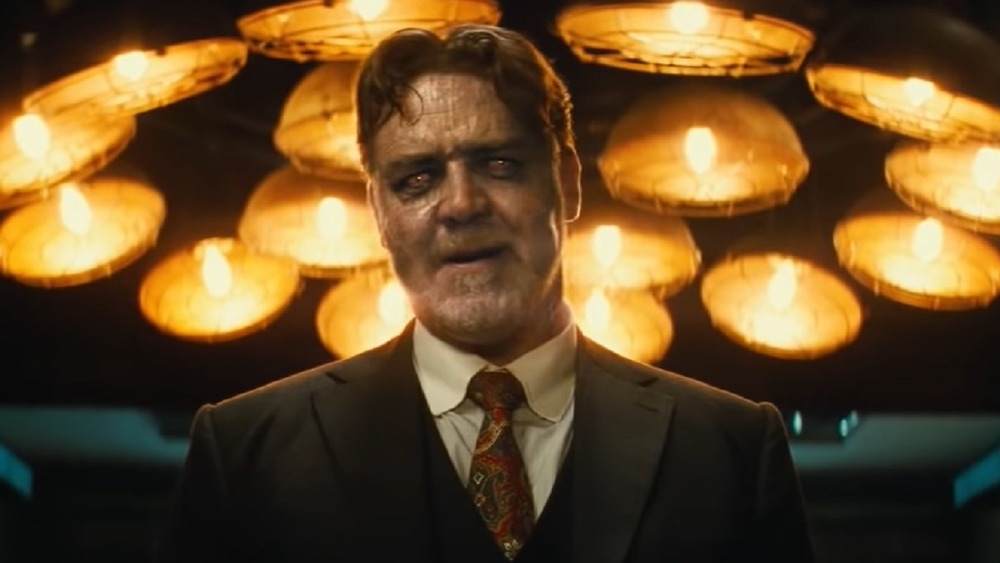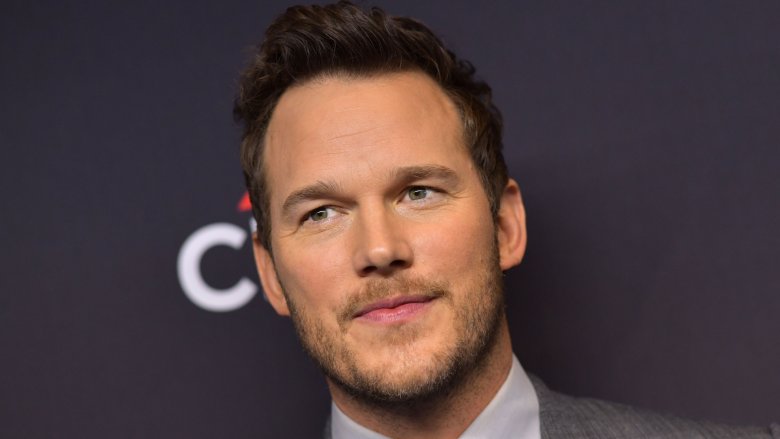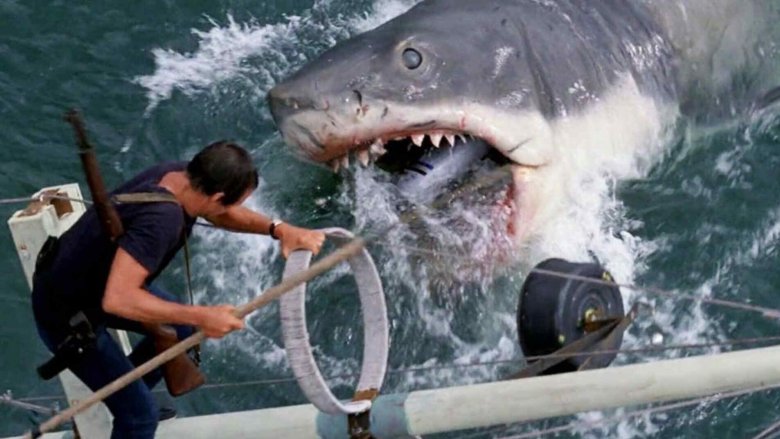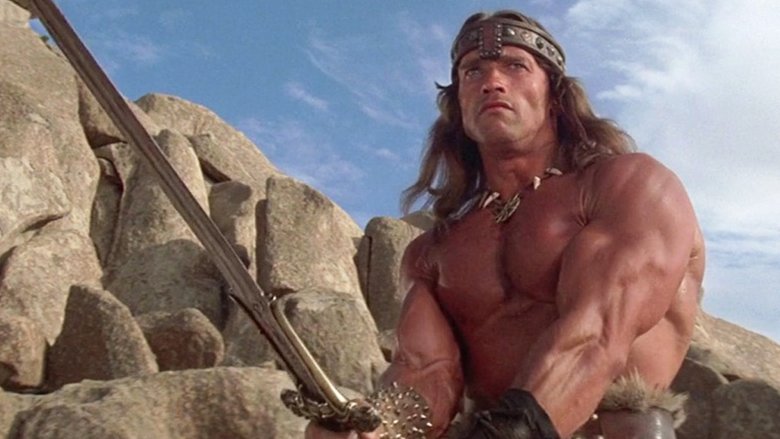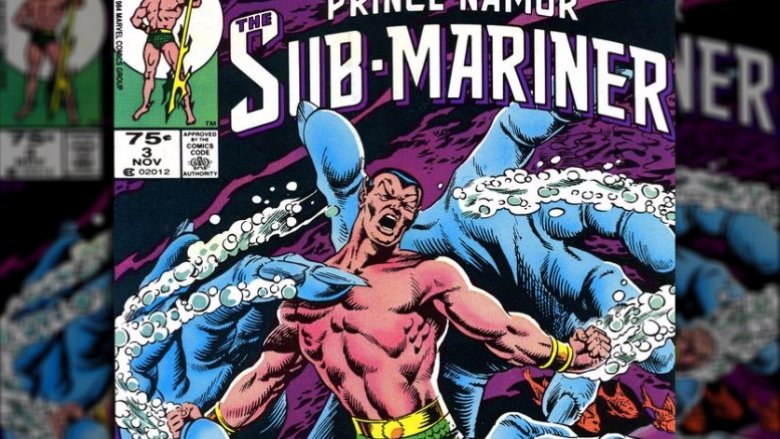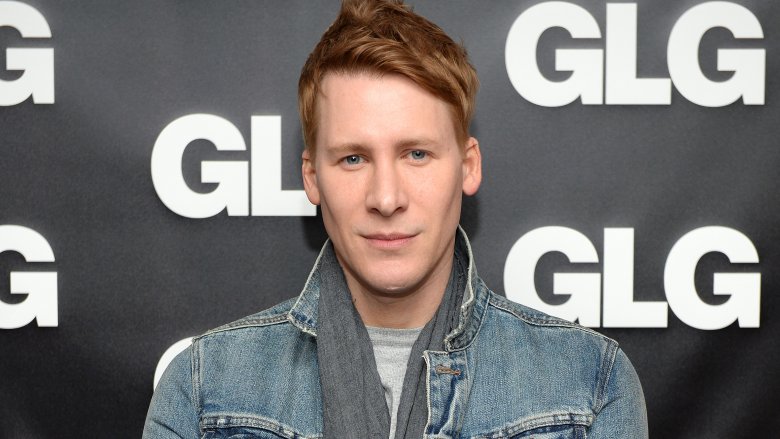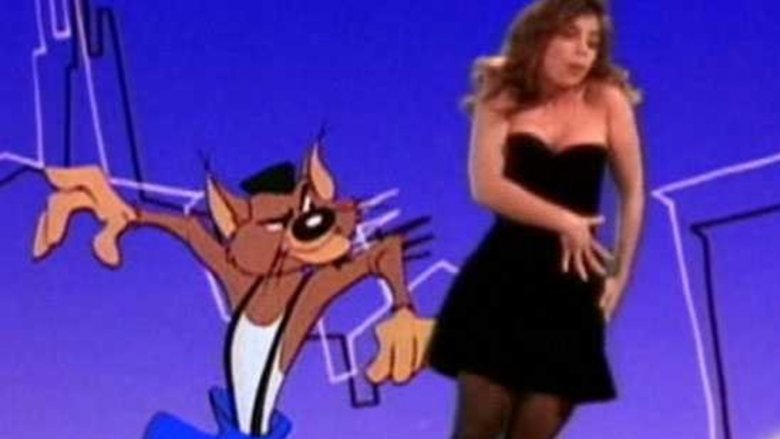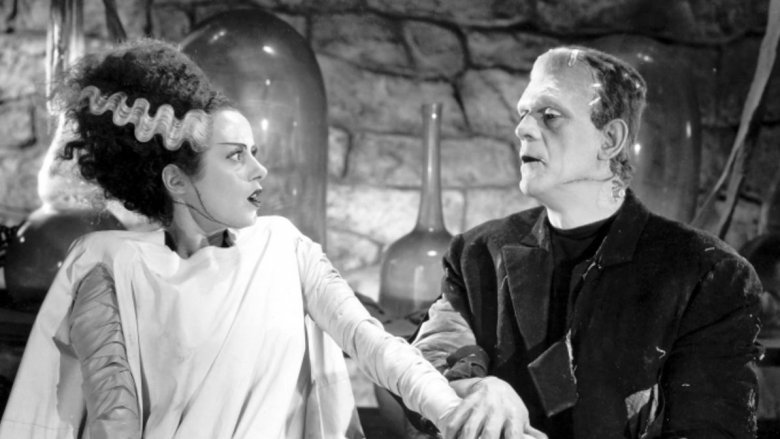Cancelled Universal Movies We'll Never Get To See
A lot of things have to go right for a movie to get made. A studio has to find a good script, then secure shooting locations and line up producers, a director, a cast, and a crew. And that doesn't even count the actual filming of the movie — a complicated ordeal that costs millions and takes months. Somehow, enough films survive the process that a few new ones pop up each week at the local multiplex, but a shocking number of projects wind up cancelled.
Perhaps making a movie gets a little easier for a studio the longer they do it. Universal Pictures is one of the oldest continuously operating studios in Hollywood. Founded more than 100 years ago, the juggernaut is responsible for some of the biggest hits of all time, including E.T.: The Extra-Terrestrial, Jurassic Park, and the Fast & Furious franchise. The company's famous logo is a spinning globe, and sometimes, as that orb spins, it seems to throw a few projects into oblivion. Here are some Universal Pictures movies that were cancelled before they could ever light up the inside of a theater.
Cowboy, ninja, viking, Pratt, done
Everyone can agree that cowboys are awesome, as are ninjas, as well as Vikings. Well, some geniuses thought, what if they were all combined into one wonderful mega-trope? That's the rough idea behind the graphic novel Cowboy Ninja Viking by A.J. Lieberman and Riley Rossmo.
The story is about psychotherapist Dr. Sebastian Ghislain who can transform into multiple secret agent personas or "Triplets." (Those personas are, of course, a cowboy, a ninja, and a Viking.). According to The Hollywood Reporter, Chris Pratt had signed on to star as the good doctor, alongside Priyanka Chopra. Game of Thrones episode director Michelle McLaren would've made her feature film debut, working from a $65 million budget with a script that'd been written at various stages by guys who'd worked on Rampage, The Hangover II, and Deadpool.
The film had a projected release date of June 28, 2019, and it looked to be a fun action comedy and a likely blockbuster, but just a week after the Chopra casting news, Universal pulled the movie off its schedule and called off production, delaying the film indefinitely. According to an insider, the film had some screenplay issues, and rumors of calling the whole thing off bounced around for five months before Universal threw in the towel.
A Halo movie never got off the ground
According to a report by Wired in 2017, Halo publisher Microsoft aggressively tried to get a film version of its mega-popular video game series going in 2005. The software giant took bids from interested studios, but only big ones and not Columbia Pictures, as it was owned by Sony, maker of the PlayStation, the biggest competitor to the Microsoft Xbox. Ultimately the only two parties left vying for the right to make Halo were Fox and Universal, who decided to team up and split the likely enormous production costs of making a sci-fi combat film.
At first, things were going just fine. Halo got a screenplay by Alex Garland (28 Days Later, Ex Machina), and Neil Blomkamp (District 9) signed on to direct, but then Blomkamp wanted too much creative control. He thought he could make a cool, "cyberpunk"-type movie, while he said executives wanted a "generic, boring film — something like G.I. Joe or some crap like that." With the parties so deeply at odds, Halo fell apart. Fans still have a slim reed of hope to hold onto, however: Showtime announced a live-action Halo series in 2020, and if that does well enough, who knows? Perhaps a movie might be in the cards after all.
Universal wasn't interested in a Jaws movie with bite
After the release of the unnecessary but successful Jaws 2 in 1978 and the success of the full-length disaster movie parody Airplane! in 1980, Jaws producers David Brown and Richard Zanuck wondered if the same rapid-fire joke format could be applied to the Jaws franchise. They contacted Matty Simmons, publisher of iconic '70s humor magazine National Lampoon and the man behind the brand that released Animal House. Simmons decided to be a producer, too, and the three guys set out to make Jaws 3, or as they hilariously called it, Jaws 3, People 0.
The producers pursued Joe Dante to direct, as he'd just helmed a Jaws knockoff called Piranha, and they got regular Lampoon contributors Tod Carroll and John Hughes (just before he became a giant of '80s cinema) to write a script. The very silly, Hollywood-satirizing plot takes place after Jaws novelist Peter Benchley gets attacked by a shark in a swimming pool. That's when a film crew ties to make a Jaws sequel (this time the shark is an alien) while trying to not get eaten by an actual shark. Ultimately, Zanuck and Brown were afraid to go into the water, as they didn't think it would be the best idea to so thoroughly mock their meal ticket. In the end, Universal did make a third Jaws movie ... 1983's non-humorous Jaws 3-D.
A cancelled Guillermo del Toro movie? The horror!
Who but Guillermo del Toro, a modern visionary of the spooky and surreal (Pan's Labyrinth, The Shape of Water) could adapt a classic work of terrifying science fiction by the legendary H.P. Lovecraft? At the Mountains of Madness is a 1931 novella about scientists who discover the ancient and frightening alien mutants who live within Antarctica, and making it into a movie has long been a passion project for del Toro.
Because of his proven track record — along with interest from Tom Cruise and James Cameron — Universal similarly thought At the Mountains of Madness just might make a great movie, and the studio paid for del Toro to come up with some creature designs. What the studio didn't like was del Toro's projected budget of $150 million on a project that would most definitely earn an R rating for its violence and general scariness, thus limiting its box office draw by shutting out teenage filmgoers. Del Toro ultimately blamed himself, saying that he "should have lied" to Universal and just told them that he'd shoot for a PG-13 ending so as to get them to greenlight the movie. It remains a tantalizing missed opportunity that the director hasn't forgotten: In 2020, he told Indiewire (via MovieWeb) that he wore a specific ring in order to remind himself of Mountains of Madness. "I'm gonna wear it until I make the movie," he insisted. "They may bury me with it."
Conan 3 just wasn't meant to be
Former bodybuilder and future California governor Arnold Schwarzenegger first proved that he could headline a movie (even with a thick Austrian accent) with the release of the epic 1982 fantasy Conan the Barbarian. In the film, Schwarzenegger takes the classic hero's journey as a mighty, musclebound, sword-carrying warrior out to avenge the death of his parents. The film was a surprise hit, earning $39.5 million at the domestic box office (huge for 1982), indicating a big appetite for a sequel. Conan the Destroyer followed in 1984 and brought in similar revenues for Universal. A third movie in the series finally got underway ... about 30 years later.
Chris Morgan, screenwriter of multiple Fast & Furious films, came on board with a solid premise. "Our take was Conan, 30 years later, a story like the Clint Eastwood Unforgiven," Morgan told Entertainment Weekly in 2017. Morgan even pitched it to Schwarzenegger, who was "excited" about reprising his role. However, Universal had a number of concerns that Morgan and others working on the project couldn't overcome. As he explained, "Ultimately the budget was big, the studio was not really sure of the title, and the relevance in the marketplace. They ended up letting it go." The project remains in limbo, but in 2019, screenwriter Chris Morgan told the Hollywood Reporter (via Syfy) that he still had hopes of bringing the "Old Man Conan" movie — provisionally titled The Legend of Conan — to theaters. "It might happen in another life," mused Morgan. "We're looking into it."
Morgan's stubborn allegiance to Legend of Conan is admirable, but his star isn't getting any younger. Odds of seeing this film come to fruition are probably fairly slim.
Universal cancelled a couple of Marvel-ous ideas
Before Marvel and Disney assembled to launch the Marvel Cinematic Universe, the comics publisher contracted with various studios to bring its superheroes to the big screen. Universal landed the rights to the Incredible Hulk, and with Hulk (starring Eric Bana and directed by Ang Lee) in production in late 2002, the studio was so confident that it made agreements to make two more Marvel movies. "Universal Pictures has proven to us that it has the vision and creativity to bring our superheroes to the big screen in grand fashion," said Marvel Studios CEO Avi Arad (via CBR), before announcing that Sub-Mariner and Prime would both get the film treatment. "Sub-Mariner will be an epic underwater tale of majestic fantasy," he said, and that Prime would amount to "a complete departure" and represent "Marvel's first superhero action-comedy."
The task of bringing the story of Sub-Mariner, an amphibious man from Atlantis who is not Aquaman, fell to David Self (Road to Perdition). Meanwhile, the duo of Chris Conroy and Don Calame — whose only credit at the time was a 2001 Disney Channel movie called Hounded — got the Prime gig, which concerned a teenage boy who could turn into a full-grown superhero (but who is not Shazam). Seeing as it's been roughly 20 years since these films were announced, during which time Marvel found itself a home at Disney, Sub-Mariner is likely dead in the water, and it's no longer Prime's time. Of course, that doesn't mean the character's been forgotten: When MCU fans mused that a mention of "tremors off the coast of Africa" in Avengers: Endgame could be a subtle nod to Namor, screenwriter Christopher Markus confirmed it, tweeting "Sometimes, you plant seeds. Sometimes, they grow." Might we see the Sub-Mariner in an upcoming phase of Marvel's blockbuster franchise? Time will tell.
Dustin Lance Black shook off an earthquake movie
In 2009, screenwriter Dustin Lance Black won an Academy Award for his script for Milk, only his second feature film. Much of Hollywood suddenly wanted to be in business with Black, and over the next couple of years, he wrote the indie film Virginia and Clint Eastwood's J. Edgar Hoover biopic J. Edgar. On the heels of that, he signed up with producer J.J. Abrams and Universal to write the script for a '70s-style disaster movie called Earthquake (but unrelated to the 1974 disaster movie Earthquake). Universal had been trying to get Earthquake shaking for four years at that point, and Black's script would replace one already written by David Seltzer (The Omen).
However, it would seem that Dustin Lance Black, circa 2012, might've carried some kind of curse. When he agreed to write Earthquake, he was also under contract to write three other scripts: 3 Story, Barefoot Bandit, and Under the Banner of Heaven. None of those films ever materialized, and Earthquake hasn't been mentioned in the industry trades since the announcement of Black's involvement. The screenwriter moved on to create the acclaimed 2017 ABC miniseries When We Rise, while another studio's project may have killed the novelty (and marketability) of Earthquake. Around the time of Earthquake's development, New Line started work on San Andreas, released to theaters in 2015.
Paula Abdul's rapping cartoon cat boyfriend movie was understandably cancelled
Who Framed Roger Rabbit? ushered in a new era of projects that seemingly mixed live-action with animation ... and helped bring on the music video for Paula Abdul's "Opposites Attract." The song is a duet, and the male voice is credited to "The Wild Pair," a singing duo consisting of Bruce DeShazer and Marv Gunn, but in the video, those vocals are synced up to the flapping mouth of an animated cat named MC Skat Kat. The clip proved so popular that Virgin Records gave MC Skat Kat — and his expanded universe of cool feline friends, including Fatz, Taboo, Micetro, Leo, Kathleen, and Silk — a spinoff album in 1991 called MC Skat Kat and the Stray Mob. While the video for the single "Skat Strut" performed well on MTV, it stalled at #96 on the Billboard Hot 100. That lack of public interest is likely what killed development of more MC Skat Kat-related multimedia projects. See, at the peak of this minor mania, Virgin Music and Universal Pictures discussed a live action/animated big-screen MC Skat Kat movie. It never got past the planning stages, and neither did a proposed MC Skat Kat Saturday morning cartoon for Fox.
Universal goes dark on the Dark Universe
After Disney launched the Marvel Cinematic Universe and Warner Bros. created the DC Extended Universe, Universal realized it could have its own interconnected film series, too. Remembering that it made classic monster movies in the 1930s — including Dracula (starring Bela Lugosi), Frankenstein (with Boris Karloff), The Invisible Man (starring Claude Rains), and Bride of Frankenstein (with Elsa Lanchester) — Universal decided to reboot and link those films together.
In 2014, Universal announced that filmmakers Alex Kurtzman and Chris Morgan would lead the project, which in 2017, it named the Dark Universe. Along with that news, Universal said it would produce Bride of Frankenstein, directed by Bill Condon and scheduled for release on February 19, 2019. Then would come movies with Javier Bardem as Frankenstein's monster, Johnny Depp as the Invisible Man, and Russell Crowe as Dr. Jekyll and Mr. Hyde. And none of these movies happened. Why?
Well, blame The Mummy. This early Dark Universe entry earned savage reviews (it sits at a woeful 16 percent on Rotten Tomatoes) and a so-so, money-losing $80 million at the domestic box office. A few months later, Kurtzman and Morgan left the Dark Universe (and Universal altogether), and the studio postponed Bride from its 2019 release, saying in a statement that "this special movie needs more time to come together."
Nevertheless, in January 2019, Universal proclaimed that the Dark Universe was over, but said that it would continue to develop some of those monster movies into standalone films, particularly The Invisible Man.
